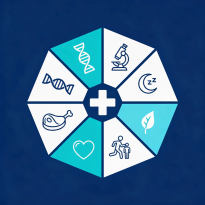Why Does Cancer Cause Death?(Cancer Cachexia)
Cancer is a collection of cells that grow uncontrollably due to accumulated mutations. These cells no longer respond to external signals, allowing them to multiply indefinitely within the body. Cancer cells are invasive and metastatic, meaning they have the ability to spread to other parts of the body, disrupting normal function.
Tumor Cells Are Not Inherently Toxic
Cancer cells themselves are not directly toxic. However, due to their rapid and unregulated growth, they can interfere with the function of vital organs, which can lead to death. When cancer invades critical systems of the body, such as the digestive, respiratory, circulatory, or neurological systems, it prevents those organs from functioning normally, which can be fatal.
Common Causes of Death from Cancer
Death caused by cancer often results from the disruption of essential bodily functions. Common reasons include:
- Digestive system failure: Cancer may block or damage parts of the digestive tract, hindering nutrient absorption and causing malnutrition.
- Respiratory failure: Cancer spreading to the lungs can obstruct airways or damage lung tissue, making it difficult to breathe.
- Bone metabolism disorders: Cancer in the bones can weaken them, leading to fractures or severe metabolic imbalances.
- Liver failure: Tumors in the liver may impair its ability to detoxify the blood, regulate metabolism, or produce essential proteins.
- Vascular dysfunction: Cancer can impair blood circulation, either by invading blood vessels or by causing clotting disorders.
Cancer Cachexia
A major cause of death in cancer patients is a condition called cancer cachexia. Cancer cachexia is a multifactorial syndrome characterized by severe weakness, loss of appetite, and the gradual loss of body fat and muscle mass. This occurs even when the patient has not significantly reduced their food intake.
In patients with cancer cachexia, their basal metabolic rate (BMR) often increases despite reduced caloric consumption. The condition is believed to be driven by soluble factors such as cytokines, which are produced by both the host (the patient’s body) and the tumor itself. These cytokines play a major role in the inflammatory response and contribute to the wasting of body tissues.
No Cure for Cancer Cachexia
Unfortunately, there is no cure for cancer cachexia aside from removing the tumor causing it. However, this is often not possible, especially in advanced stages of cancer where the tumor has spread. Cancer cachexia frequently leads to a reduction in chemotherapy doses because the patient’s physical weakness makes them less able to tolerate aggressive treatments.
Research and Treatments for Cancer Cachexia
Although there is no definitive cure for cancer cachexia, research is ongoing to find ways to manage and mitigate its effects. Treatments currently being explored include:
- Dietary interventions: Specialized diets designed to provide adequate nutrition and counteract the metabolic imbalances associated with cachexia.
- Anti-inflammatory drugs: Medications aimed at reducing the inflammation caused by cytokines, which may help slow the progression of cachexia.
- Physical therapy: Exercise programs aimed at maintaining muscle mass and physical function.
- Hormone therapy: Some treatments involve hormones or anabolic agents that promote muscle growth and counteract wasting.
Cancer cachexia is responsible for up to one-third of cancer-related deaths. It is often triggered by either the rapid growth of the cancer itself or the aggressive treatments used to combat the disease. As a result, improving the quality of life for patients with cancer cachexia, as well as developing better treatment strategies, remains a crucial area of research.
The Importance of Understanding Cancer and Cachexia
Understanding cancer’s effects on the body and the factors leading to cancer-related deaths, such as cachexia, is essential for improving patient outcomes and developing new treatments. Cachexia remains a significant challenge in cancer treatment, and research efforts are focused on not only extending survival but also improving the quality of life for patients facing this devastating syndrome.
For the original Korean text, visit here.
If you’re curious about the basics of traditional Korean medicine and health, read the following article:
What Your Sleeping Position Says About Your Health
Learn Why Studying JangSang Medicine is Important.
Frequently Asked but Silly Questions (Foods Good for the Liver??)
Thank you for reading.


